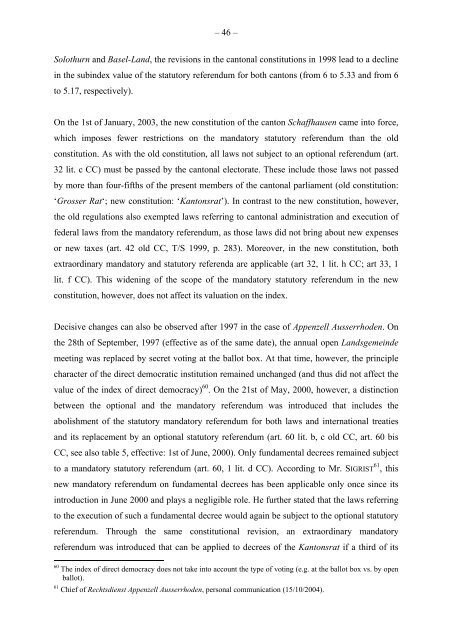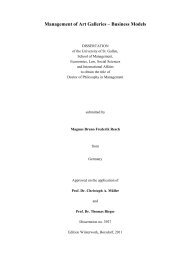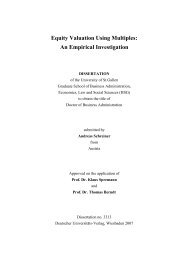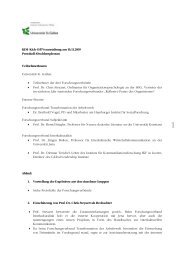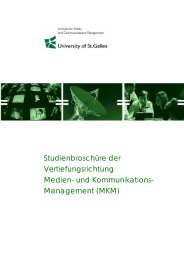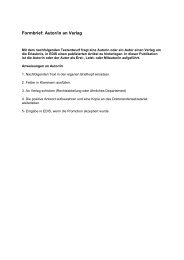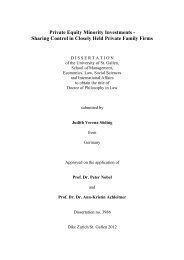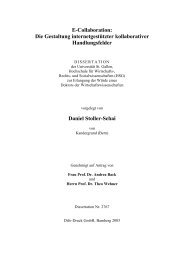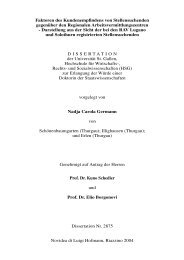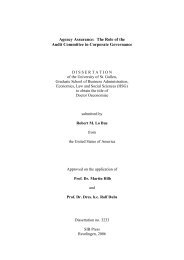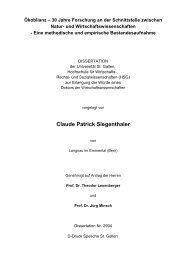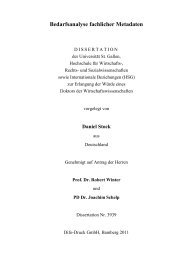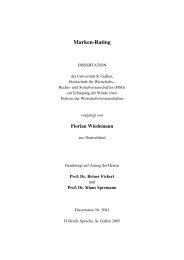The Impact of Direct Democracy on Society - Universität St.Gallen
The Impact of Direct Democracy on Society - Universität St.Gallen
The Impact of Direct Democracy on Society - Universität St.Gallen
- No tags were found...
You also want an ePaper? Increase the reach of your titles
YUMPU automatically turns print PDFs into web optimized ePapers that Google loves.
– 46 –Solothurn and Basel-Land, the revisi<strong>on</strong>s in the cant<strong>on</strong>al c<strong>on</strong>stituti<strong>on</strong>s in 1998 lead to a declinein the subindex value <str<strong>on</strong>g>of</str<strong>on</strong>g> the statutory referendum for both cant<strong>on</strong>s (from 6 to 5.33 and from 6to 5.17, respectively).On the 1st <str<strong>on</strong>g>of</str<strong>on</strong>g> January, 2003, the new c<strong>on</strong>stituti<strong>on</strong> <str<strong>on</strong>g>of</str<strong>on</strong>g> the cant<strong>on</strong> Schaffhausen came into force,which imposes fewer restricti<strong>on</strong>s <strong>on</strong> the mandatory statutory referendum than the oldc<strong>on</strong>stituti<strong>on</strong>. As with the old c<strong>on</strong>stituti<strong>on</strong>, all laws not subject to an opti<strong>on</strong>al referendum (art.32 lit. c CC) must be passed by the cant<strong>on</strong>al electorate. <str<strong>on</strong>g>The</str<strong>on</strong>g>se include those laws not passedby more than four-fifths <str<strong>on</strong>g>of</str<strong>on</strong>g> the present members <str<strong>on</strong>g>of</str<strong>on</strong>g> the cant<strong>on</strong>al parliament (old c<strong>on</strong>stituti<strong>on</strong>:‘Grosser Rat‘; new c<strong>on</strong>stituti<strong>on</strong>: ‘Kant<strong>on</strong>srat’). In c<strong>on</strong>trast to the new c<strong>on</strong>stituti<strong>on</strong>, however,the old regulati<strong>on</strong>s also exempted laws referring to cant<strong>on</strong>al administrati<strong>on</strong> and executi<strong>on</strong> <str<strong>on</strong>g>of</str<strong>on</strong>g>federal laws from the mandatory referendum, as those laws did not bring about new expensesor new taxes (art. 42 old CC, T/S 1999, p. 283). Moreover, in the new c<strong>on</strong>stituti<strong>on</strong>, bothextraordinary mandatory and statutory referenda are applicable (art 32, 1 lit. h CC; art 33, 1lit. f CC). This widening <str<strong>on</strong>g>of</str<strong>on</strong>g> the scope <str<strong>on</strong>g>of</str<strong>on</strong>g> the mandatory statutory referendum in the newc<strong>on</strong>stituti<strong>on</strong>, however, does not affect its valuati<strong>on</strong> <strong>on</strong> the index.Decisive changes can also be observed after 1997 in the case <str<strong>on</strong>g>of</str<strong>on</strong>g> Appenzell Ausserrhoden. Onthe 28th <str<strong>on</strong>g>of</str<strong>on</strong>g> September, 1997 (effective as <str<strong>on</strong>g>of</str<strong>on</strong>g> the same date), the annual open Landsgemeindemeeting was replaced by secret voting at the ballot box. At that time, however, the principlecharacter <str<strong>on</strong>g>of</str<strong>on</strong>g> the direct democratic instituti<strong>on</strong> remained unchanged (and thus did not affect thevalue <str<strong>on</strong>g>of</str<strong>on</strong>g> the index <str<strong>on</strong>g>of</str<strong>on</strong>g> direct democracy) 60 . On the 21st <str<strong>on</strong>g>of</str<strong>on</strong>g> May, 2000, however, a distincti<strong>on</strong>between the opti<strong>on</strong>al and the mandatory referendum was introduced that includes theabolishment <str<strong>on</strong>g>of</str<strong>on</strong>g> the statutory mandatory referendum for both laws and internati<strong>on</strong>al treatiesand its replacement by an opti<strong>on</strong>al statutory referendum (art. 60 lit. b, c old CC, art. 60 bisCC, see also table 5, effective: 1st <str<strong>on</strong>g>of</str<strong>on</strong>g> June, 2000). Only fundamental decrees remained subjectto a mandatory statutory referendum (art. 60, 1 lit. d CC). According to Mr. SIGRIST 61 , thisnew mandatory referendum <strong>on</strong> fundamental decrees has been applicable <strong>on</strong>ly <strong>on</strong>ce since itsintroducti<strong>on</strong> in June 2000 and plays a negligible role. He further stated that the laws referringto the executi<strong>on</strong> <str<strong>on</strong>g>of</str<strong>on</strong>g> such a fundamental decree would again be subject to the opti<strong>on</strong>al statutoryreferendum. Through the same c<strong>on</strong>stituti<strong>on</strong>al revisi<strong>on</strong>, an extraordinary mandatoryreferendum was introduced that can be applied to decrees <str<strong>on</strong>g>of</str<strong>on</strong>g> the Kant<strong>on</strong>srat if a third <str<strong>on</strong>g>of</str<strong>on</strong>g> its60 <str<strong>on</strong>g>The</str<strong>on</strong>g> index <str<strong>on</strong>g>of</str<strong>on</strong>g> direct democracy does not take into account the type <str<strong>on</strong>g>of</str<strong>on</strong>g> voting (e.g. at the ballot box vs. by openballot).61 Chief <str<strong>on</strong>g>of</str<strong>on</strong>g> Rechtsdienst Appenzell Ausserrhoden, pers<strong>on</strong>al communicati<strong>on</strong> (15/10/2004).


